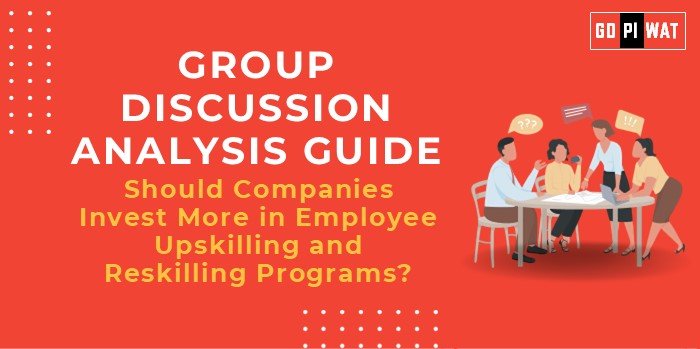📋 Group Discussion Analysis Guide
🌟 Topic: Should Companies Invest More in Employee Upskilling and Reskilling Programs?
🌐 Introduction to the Topic
Opening Context: In a rapidly evolving job market influenced by digital transformation, artificial intelligence, and globalization, upskilling and reskilling are becoming critical for workforce competitiveness.
Topic Background: With the World Economic Forum estimating that 50% of employees will need reskilling by 2025, businesses are increasingly under pressure to adapt. Companies must evaluate the ROI of such investments in light of employee retention, productivity, and innovation.
📊 Quick Facts and Key Statistics
- 📈 Upskilling Need: 50% of employees globally will need reskilling by 2025 (WEF).
- 💰 Corporate Spend: Companies globally invested $359 billion in corporate training in 2023 (Statista).
- 🔗 Retention Impact: 94% of employees say they would stay longer with an organization that invests in their learning (LinkedIn Workplace Learning Report).
- 🚀 Skills Gap: 87% of employers report skill gaps in their workforce (McKinsey).
- 🤖 AI Adoption: 85% of companies plan to adopt AI, but 60% lack skilled personnel for implementation (PwC).
👥 Stakeholders and Their Roles
- Employers: Drive and fund upskilling initiatives; focus on ROI and talent retention.
- Employees: Engage in learning to secure job relevance and career growth.
- Educational Institutions: Collaborate with companies to design industry-relevant programs.
- Government Bodies: Offer incentives for corporate training and create skill enhancement policies.
- Tech Platforms: Provide digital tools for scalable and personalized learning solutions.
✔️ Achievements and Challenges
🎯 Achievements:
- 📈 Higher Productivity: Companies with strong learning cultures are 30% more likely to be market leaders.
- 💼 Employee Retention: Reduces turnover by fostering loyalty.
- 💡 Enhanced Innovation: Trained employees contribute better to innovation strategies.
⚠️ Challenges:
- 💸 High Costs: Significant budget allocation required.
- 📊 Measurement Complexity: Difficult to quantify ROI.
- ⚖️ Equity Issues: Disparity in access to training resources for small businesses versus large corporations.
🌍 Global Comparisons:
- 🇸🇬 Singapore: SkillsFuture initiative incentivizes continuous learning for workers.
- 🇩🇪 Germany: Strong apprenticeship models bridge skill gaps effectively.
🛠️ Structured Arguments for Discussion
- 💪 Supporting Stance: “Investing in reskilling enhances productivity, boosts employee morale, and positions companies as future-ready.”
- 🛑 Opposing Stance: “The cost of training and uncertainty in ROI might deter companies, especially SMEs, from large-scale investment.”
- ⚖️ Balanced Perspective: “While reskilling offers clear long-term benefits, companies must implement targeted and cost-effective strategies to optimize returns.”
💡 Effective Discussion Approaches
- Opening Approaches:
- 📊 “As AI adoption accelerates, over 40% of current jobs risk automation, making reskilling indispensable.”
- 📈 “94% of employees prefer organizations that prioritize learning and development; this statistic highlights the competitive advantage of upskilling initiatives.”
- Counter-Argument Handling:
- 💸 “While costs are high, the cost of attrition or a disengaged workforce is significantly higher in the long term.”
- 🌐 “Even SMEs can adopt scalable and affordable digital learning platforms to address budget constraints.”
🔍 Strategic Analysis of Strengths and Weaknesses
- ✅ Strengths: Improved workforce adaptability, increased innovation capacity, competitive edge in talent attraction.
- ❌ Weaknesses: High upfront investment, uneven access across industries.
- 🌟 Opportunities: Leverage digital tools for scalable learning, form public-private partnerships for co-financing.
- ⚠️ Threats: Rapid technological advancements outpacing training programs, risk of employee poaching by competitors.
🏫 Connecting with B-School Applications
- Real-World Applications: HR strategies for workforce transformation, financial modeling of training ROI.
- Sample Interview Questions:
- 🧮 “How can companies measure the effectiveness of reskilling programs?”
- 🤝 “Discuss a public-private model to promote corporate training initiatives.”
- Insights for B-School Students:
- 📚 Use case studies on training ROI for project research.
- 💻 Understand the integration of AI in HR and learning strategies.


